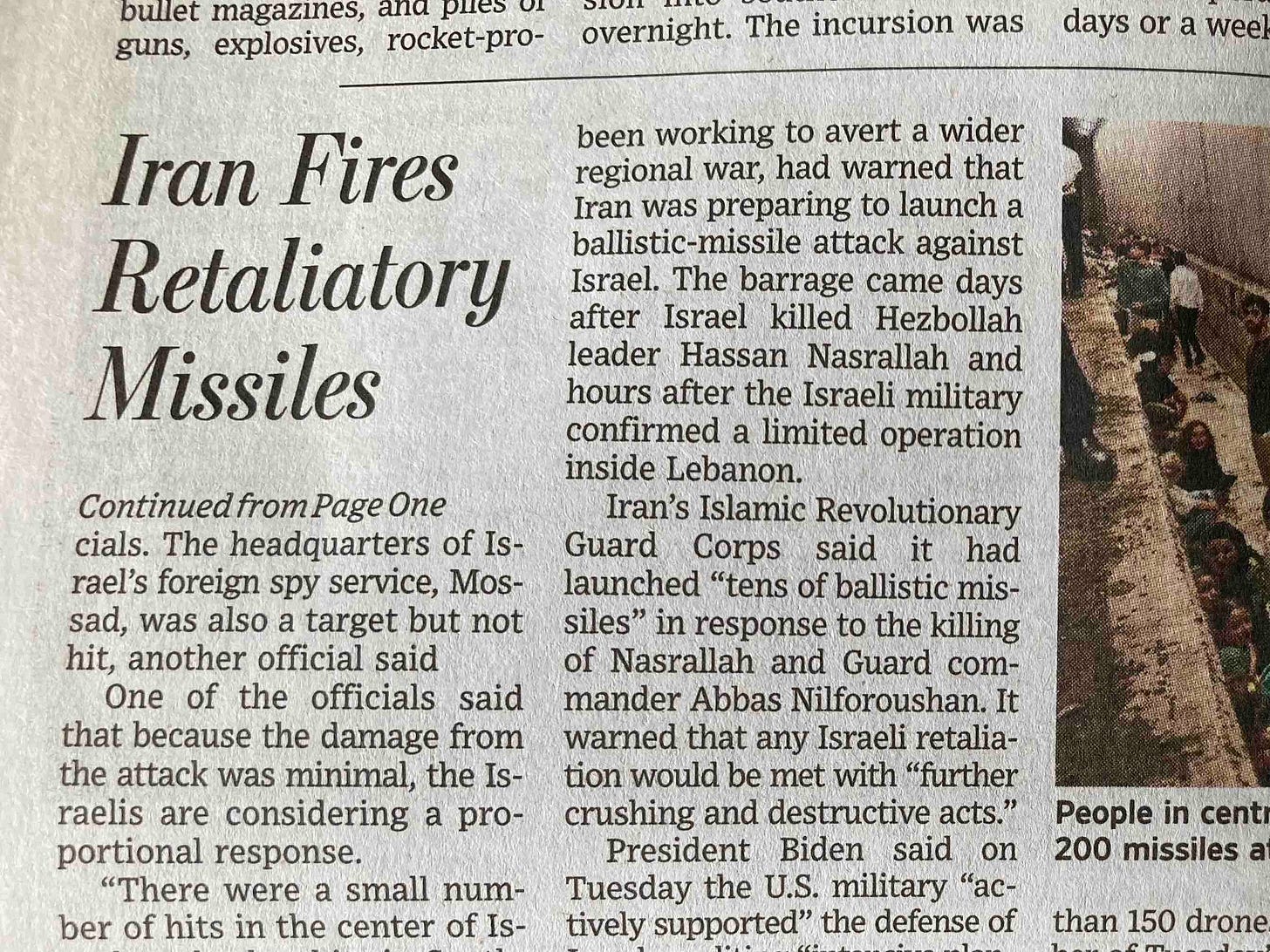Revenge of the Cole
Plus, how activists killed a Harvard art museum; Joe Castiglione; Vance debates
After Iran’s attack on Israel, the U.S. Department of Defense made a point of naming the two U.S. Navy vessels in the Eastern Mediterranean that had fired interceptors at the Iranian missiles. One of them was an Arleigh Burke-class destroyer called the USS Cole.
Yes, that USS Cole—the one that, on October 12, 2000, was attacked in the port of Aden, Yemen, by Al Qaeda operatives in a Zodiac-style speedboat, killing 17 sailors and wounding dozens more.
I’m aware that Al Qaeda is Sunni while the Iranians are Shiites, though that hasn’t prevented Iran from hosting Al Qaeda leaders such as Abd al-Rahman al-Maghrebi. Iran and Al Qaeda are two faces of the same extremist Islamist enemy that wants death to Israel, death to America, and an end to capitalism.
So it’s nice to see the Cole still actively in the fight. It seems a long time—nearly a quarter century from when the ship was attacked. It’s long enough that some Americans may have forgotten the October 2000 attack, or not remember the significance of the Cole. One can see the duration of time as disappointing, in that victory remains elusive. Yet I prefer to see it as encouraging— that, notwithstanding the attack, the Cole has endured as a weapon to defend America and its allies in this war. And America has endured as a globally potent naval power.
With better political leadership and more American public understanding of the issues at stake, perhaps the Cole’s mission will soon turn to include not only defending Israel and American assets from attack but also the purpose of helping the region and the Iranian people by weakening or removing the Iranian regime.
Ed Glaeser on how activists killed a Harvard modern art museum: A professor of economics at Harvard, Ed Glaeser, gives an interview to Jon Hartley’s The Capitalism and Freedom in the 21st Century Podcast. I found three passages noteworthy. The first is about how neighborhood opposition killed a plan by Harvard President Neil Rudenstine for a new museum along the Charles River that was to be devoted to modern art:
Starting in the late 1990s, actually, I think it was 1999. I was put on Harvard's University physical planning committee just after I got tenure. And the outgoing president, Neil Rudenstine, was very keen to build a contemporary art museum designed by the great architect Renzo Piano on a site that Harvard owned right on the Charles River.
Now, this museum, which would be an architectural glory and a business draw for Cambridge, would unfortunately slightly mar the view of one middle-level employee at a public radio station, okay? This mid-level employee was fairly effective at organizing, I don't know, 14 neighbors. And singlehandedly, they were essentially able to stop Harvard from doing this.
And the whole thing eventually died when Neil left, and his successor was not interested in doing it. I was amazed by the power of just a very small number of people to do something that you would have thought was strongly against the interest of the community as a whole.
[Piano did work on a renovation and addition to the Harvard art museum on its existing site, which is actually pretty well done.] The second is Glaeser talking about what he likes about his academic field of interest:
What I love about land use reform is, one, it's about free people and free markets. It's about fundamentally giving property owners the right to do what they want with their own property. That sits with something very deep within my soul.
And two, it's good for poor people, right? It's an area in which if you allow more housing to be built, it means the prices of housing is gonna go down for ordinary people. And so it's both progressive and libertarian. And why not choose something that leans in both directions in a way, that's in a way that sort of is appealing.
And the third is about policing:
we had this temporary movement, which was basically like the police are the problem, not the solution.
And particularly in progressive cities, San Francisco, Seattle, there was a tendency to accept that we were just gonna shut down on policing. We weren't good at it. The policing was not a thing cities needed to do. We were gonna defund the police. Well, I can't think of anything more idiotic than defunding the police, right?
This is an incredibly foolish thing. Cities need policing.
The vice presidential debate: When Trump picked J.D. Vance as his running mate I described Vance as “a politician with an unusually acute sense of the interaction between religion, culture, and politics.” And in an October 2016 column about “What Will the Post-Trump Republican Party Look Like,” I named “‘Hillbilly Elegy’ author and Marine Corps veteran turned Silicon Valley investor J.D. Vance’” as among those “whose upwardly mobile biographies bridge the Republican base and its elites.”
Vance got a moment to shine last night in the vice presidential debate with Governor Walz, and he outperformed expectations. He talked about “commonsense, bipartisan solutions.” At one point, he said, “I actually agree with Tim Walz.” He came off, generally, as civil and reasonable, decent, even, almost likable, in contrast to the press coverage that has depicted him as a misogynist monster.
He started off the night with a reasonably good answer about Israel and Iran: “support our allies when they are fighting the bad guys.”
I guess you can say it’s all in service of a broader campaign of demonizing illegal immigrants, imposing protectionist tariffs, and restoring President Trump to the White House. But bottom line, I thought Vance helped himself in the debate, to the point where it even crossed my mind to wonder whether the Republicans would be better off with him at the top of their ticket.
How the Wall Street Journal covered Iran’s attack on Israel: The Wall Street Journal’s opinion pages have been so wonderfully and consistently good on Israel and the war that it’s jarring, and disappointing, to find headlines such as this one today in the Journal news section that uncritically echoes Iran’s spin.

Joe Castiglione: The radio voice of the Boston Red Sox, Joe Castiglione, retired Sunday at the end of his 42nd season with the team, a stretch that included four World Series championships, among them the team’s first since 1918. Castiglione’s farewell speech included the words, “God has granted me so many blessings.” I’d heard a passing reference on the radio over the years to Castiglione attending Mass while on the road with the team so this came as confirmation rather than as a total surprise, but it was interesting to hear someone acknowledge so directly the source of his many blessings.
Red Sox players and Castiglione’s fellow broadcasters made a point of speaking of not only of Castiglione’s skills as a play-by-play announcer but also of his warmth and kindness. I found his voice a pleasure to listen to over the years, even during the many years the Red Sox were not winning World Series. I suspect there is some connection between the feeling of gratitude for God’s many blessings and the interpersonal warmth and kindness. Listen to Castiglione closing out his final broadcast with the words of Yale president and former Major League Baseball Commissioner Bart Giamatti’s “The Green Fields of the Mind”— “It breaks your heart. It is designed to break your heart... Just when you need it most it stops and summer is gone.” It’s hard to avoid the conclusion that it’s not only Castiglione who has been blessed but also those of us who have been lucky enough to be listening.
Show notes: The Editors will not publish Thursday or Friday owing to the Jewish holiday of Rosh Hashana. We wish all our readers a happy, healthy, safe, prosperous, secure, and free 5785. We are grateful for God’s many blessings and count our readers, especially the paying readers, high on the list. If you aren’t yet a paying customer and you can spare the $8 a month or $80 a year, please sign up today to support our growth, sustain our independent journalism, and ensure your continued full access.




Senator Vance had some good moments, such as pushing back on the remarkably biased conduct of moderator Margaret Brennan. But Vance's biggest fail was in the closing statement, failing to skewer Walz' closing statement quote that "Kamala Harris is bringing us a new way forward. She's bringing us a politics of joy."
I would have responded "We got only one question about the deteriorating international situation under the Biden-Harris administration. Not a word was said about Ukraine. Judging from Iran's attack on Israel today, we could be on the verge of WWIII. Grinning has its uses, but in an international crisis it often signals weakness and naivete. When you are giggling when others are focused on a crisis it can mean that you fail to understand the seriousness of the situation."